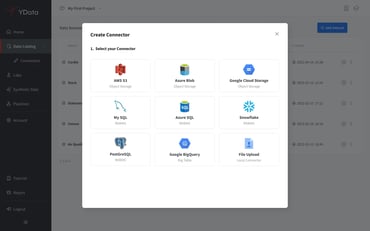Data management and analysis are critical tasks for organizations in today's digital age. With the increasing volume and complexity of information being generated every day, it is becoming more and more challenging to manage the most valuable asset of all: the data. This is where the concept of Data Fabric is a game changer.
Data Fabric is a term used to describe a data architecture that provides a seamless and flexible way to manage and access large amounts of data from multiple sources. It aims to simplify the complex process of data integration and provide a single platform for data management, processing, and analysis. Using a Data Fabric, organizations can take advantage of their data to boost business results, such as improved operational efficiency, better decision-making, and increased revenue.
For data scientists, a Data Fabric solution holds significant importance as it enables them to work with data in a more efficient and effective manner. Data scientists are responsible for finding insights in large amounts of data and providing actionable recommendations to organizations. This is often a challenging task, especially when dealing with multiple data sources, organizational silos, complex data integration processes, or even, and most commonly, issues with data quality.
With a Data Fabric, data scientists no longer have to deal with these issues. They have a single, unified view of the data they need, which they can access and analyze without worrying about the underlying infrastructure or technical details. This makes it easier for them to focus on their core competencies: analyzing hidden trends in data and putting together meaningful insights.
YData provides a comprehensive platform that allows organizations to manage, process, and analyze their data in a seamless and scalable manner. YData's Fabric is a data-centric AI development platform that provides a unified data catalog and advanced data processing and analysis capabilities. With Fabric, data scientists can easily discover, access, and process the data they need, regardless of its location or format. The solution also includes powerful data preparation and cleansing tools, which make it easier to analyze and prepare the data.
Furthermore, Fabric also includes a feature that can help organizations to break data silos and overcome data volume challenges: synthetic data generation. This feature allows organizations to generate realistic synthetic data to augment their existing data, which can be useful for training and testing AI models. Synthetic data generation can also be useful for organizations that have privacy or security concerns around using real data for analysis. It adds an extra layer to the Data Fabric concept, as it becomes self-sufficient in the capability of enabling users to access the data they need, either if it's real or synthetic.
Conclusion
Data Fabric is an essential tool for organizations looking to take advantage of their data. With a Data Fabric in place, data scientists can focus on providing valuable insights to their organizations, without the burden of overcoming other technical details. YData's Fabric is an end-to-end data-centric platform that also includes a synthetic data generation feature, a valuable tool for organizations looking to ramp up their data economy, either through data sharing or as an ML performance booster. By adopting Fabric, organizations can take advantage of their data to drive business outcomes and stay ahead of the competition.
Try out YData Fabric today and start exploring the advantages of having a Data Fabric in your organization.



